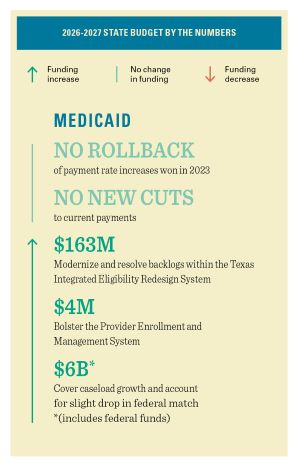
Texas physicians did not see any cuts to Medicaid payment rates or coverage in the 2025 session, with the legislature preserving the specific targeted raises the Texas Medical Association secured in 2023. That was a bigger than expected success, considering Medicaid simultaneously became a major discussion topic nationally due to proposed federal cuts to the program still pending as of this writing.
And as it stands each session, the Medicaid program already accounts for one of Texas’ largest budget items next to education, with costs up by more than $2.7 billion in state money (by $6 billion in combined state and federal funds) for the 2026-27 biennium.
“Everybody would like to see rate increases, but that wasn’t going to happen in this environment,” said Cynthia Peacock, MD, a member of TMA’s Committee on Medicaid, CHIP and the Uninsured. “What everybody was worried about was there were going to be cuts. And I just think everybody breathed a sigh of relief, to be honest with you, that all the gains that we made were not cut.”
It was not for lack of trying: TMA did make significant headway with a budget amendment seeking an additional 5% rate increase for services in health professional shortage areas, including for telemedicine, via an amendment to the state budget bill. That amendment was, however, ultimately left on the table in the negotiation process and out of the final budget.
What was included was enhanced funding TMA advocated for to modernize and resolve backlogs within the Texas Integrated Eligibility Redesign System (TIERS) – which helps determine eligibility for Medicaid and other public assistance programs – as well as to buttress the Provider Enrollment and Management System (PEMS), the electronic system physicians and others in Medicaid, the Children’s Health Insurance Program, and other state programs use for enrollment. Senate Bill 1266, which took effect Sept. 1, also helped pave the way for improvements to the PEMS enrollment portal.
“We look at that from an efficiency standpoint,” Rep. Greg Bonnen, MD (R-Friendswood), chair of the House on Appropriations, told Texas Medicine. “It’s really not a policy change as much as it is wanting to ensure we’re able to operate [Medicaid] the way that we should.”

Dr. Peacock welcomed that news, positing it could help physicians who have been experiencing payment challenges related to enrollment and credentialing backlogs and delays. She’s now hopeful the funding will help the Texas Health and Human Services Commission improve PEMS and TIERS, which she described as “antiquated systems.”
“Physicians were continuing to see Medicaid patients with the [understanding] they’ll get paid retroactively,” she said. “And a lot of them were not getting paid because it was persisting for so long to do the recredentialing.
“You should be able to recredential in 30 days, a far cry from the six to nine months physicians reportedly experience. When [physicians are] losing that much money off the top of your income, that’s going to impact your bottom line.”
Meanwhile, state legislators will monitor federal budget discussions in determining their approach to state Medicaid funding in future sessions, Representative Bonnen adds.
“One of the things we have to assess are changes that are potentially going to occur at the federal level and the impact they may have,” he said. “That’s both from the standpoint of what a provider like a doctor or hospital may be paid, but also from a fiscal standpoint … [with] an impact on the state’s obligation in the program for certain services. I don’t have the answers to how that’s all going to play out, but that’s definitely something we’re aware of.”
Phil West
Associate Editor
(512) 370-1394
phil.west[at]texmed[dot]org

Phil West is a writer and editor whose publications include the Los Angeles Times, Seattle Times, Austin American-Statesman, and San Antonio Express-News. He earned a BA in journalism from the University of Washington and an MFA from the University of Texas at Austin’s James A. Michener Center for Writers. He lives in Austin with his wife, children, and a trio of free-spirited dogs.